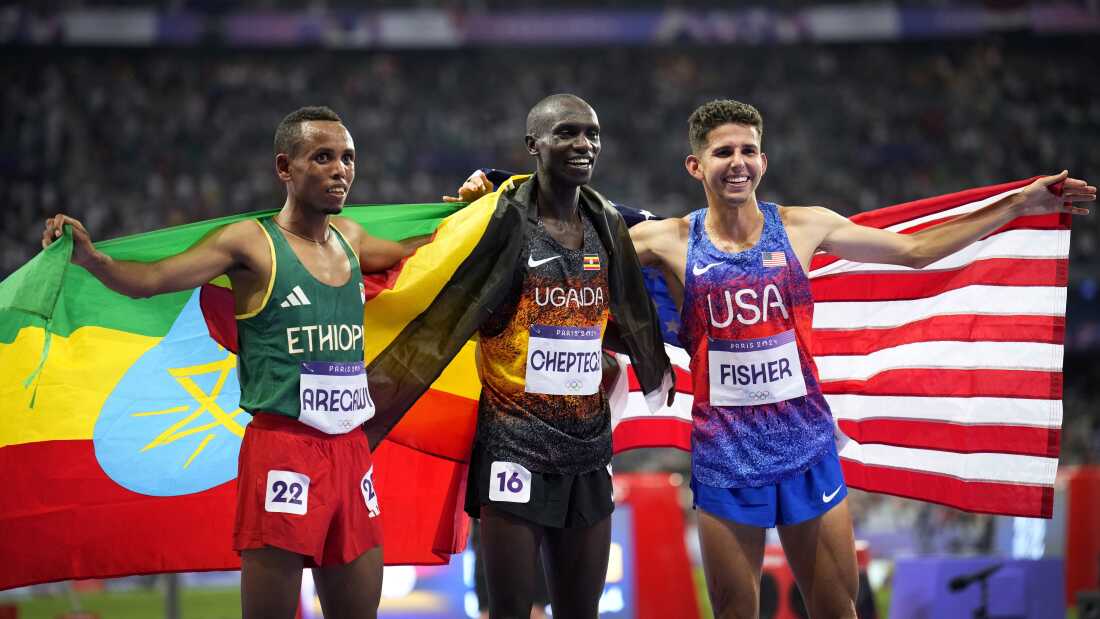Besides being at some time the world’s pre-eminent track distance runner, what does Joshua Cheptegei have in common with the likes of Haile Gebrselassie, Kenenisa Bekele, Paul Tergat and Mo Farah?
A transition to the marathon that is a little less than overwhelming, that’s what. Cheptegei ran his third marathon in Amsterdam a couple of weekends ago. He ran a personal best 2:04.52 but finished in fifth place and was never a factor in the closing stages of the race.
The glass half-full view of this is that the trend is improving. Cheptegei made his debut in Valencia two years ago, running 2:08:59 for thirty-seventh in the world’s deepest marathon. He improved a full three minutes to 2:05:59 in finishing ninth in Tokyo earlier this year where, again, he was never a contender. Nonetheless, he was quoted post-race as saying there were “some good positives to take home and prepare for another step forward.”

If Amsterdam was a forward step, which time-wise it was, then it was not much more than a baby step. You would never write off a distance runner as great as Cheptegei has been over the past decade, but he is still at the underwhelming stage of his marathon career, especially when you take into consideration that he prepared for Amsterdam without the distraction of defending his 10,000 crown at the Tokyo25 world championships.
It also must be admitted that in comparison with those other track greats in whose company he sits, we’re judging Cheptegei prematurely and comparing his fledgling marathon performances against their complete careers. Gebrselassie and Tergat, for example, set world records (both in Berlin) early in their stints at the marathon, and won major races.
Bekele, too, came within a second of the world record – then held by Eliud Kipchoge – in winning Berlin in 2018 and was second behind him in London the previous year. Yet none of these great track distance runners was ever a factor in a global championship marathon. Farah and Gebrselassie didn’t even run one.

Photo: Jon Buckle for Virgin Money London Marathon
If Cheptegei is to buck that trend, he needs more than small steps forward and he needs them in his next few marathons. Perhaps he can note Kipchoge’s early progression and draw some inspiration. Kipchoge made his debut in Hamburg in 2013, winning in 2:05:30, before placing second in 2:04:05 behind Wilson Kipsang’s world record 2:03:23 the same year. His third race was a win the following year in Rotterdam in 2:05:00.
Kipchoge came to greatness step by step. Cheptegei may yet do so, too. Despite winning the world championships 5000 metres in Paris in 2003 – ahead of Hicham El Guerrouj and Bekele – Kipchoge did not enjoy as glittering a track career as the others under discussion here. Gebrselassie won multiple Olympic and world championship 10,000s. Tergat was just as regularly the runner-up and also boasted a superb cross-country record.
Bekele matched Gebrselassie on the track and Tergat at cross-country, winning Olympic and world 5000/10,000 doubles in Beijing and Berlin. Farah had no record to speak of at cross-country but won the 5000 at the 2011 world championships, the double at four successive Olympics and worlds thereafter, and the 10,000 at the worlds in London in 2017.
On winning the cross-country in 2019, Cheptegei proclaimed his ambition to succeed Farah as the world’s dominant track runner. He won only one gold at 5000 – at the Tokyo Olympics – but with three successive world championships and one Olympic gold at 10,000, he can be said to have achieved his aim. He holds the current world records in 5000 and 10,000 and the Olympic record as well.
Highest level success at track and marathon is a rare attainment indeed. Sifan Hassan seems to achieve it easily – she won the marathon in Paris24 and took bronze medals in the 5000 and 10,000: only Zatopek with his three golds in Helsinki in 1952 has exceeded that feat; Hellen Obiri has also medalled at 1500 metres to marathon in world or Olympic competition, and won a world cross-country.

But it seems more limited in men’s distances. In an era when doubling seems to be making a comeback, with Jakob Ingebrigtsen and now Cole Hocker, winning 5000 gold medals when their ‘speciality’ is the 1500, the marathon continues to defy the trend. The best track runners have all tried it; they have all run well, certainly, but not made the same impact as on the track.
There might be many reasons – logically, the fact that track distance runners have to endure the intensity of competition for a maximum of less than half-an-hour as against the two hours plus of the marathon, looms as one. And turning to the marathon after sustained success on the track means they risk stepping up too late in their careers (Kipchoge again an exception, making his marathon debut aged 28).
For whatever reason, and despite the great advances in shoes, nutrition and training, achieving the same level of success in the marathon as on the track has been beyond the likes of Gebrselassie, Farah, Bekele and Tergat. And it’s certainly proving difficult for Joshua Cheptegei.
The marathon is sometimes referred to as the recreational runner’s Everest. It’s clearly no easy climb for the very best track distance runners either.
